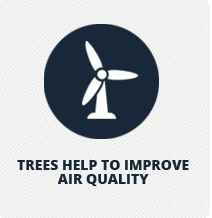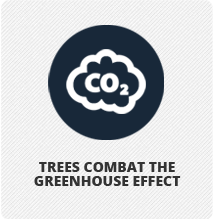The Benefits of Trees - London Ontario
Benefits of Trees.
At Olympic Tree Care, we value the many ways that trees contribute to the quality of life and make a community a desirable place to live.
At Olympic Tree Care, we value the many ways that trees contribute to the quality of life and make a community a desirable place to live.

| Trees improve air quality |
|---|
| Trees improve air quality by absorbing pollutant gases (ozone, carbon monoxide, sulphur dioxide, nitrogen oxides, and airborne ammonia) and trapping them on their leaves and bark, and releasing oxygen. |
| Trees combat the greenhouse effect |
| Carbon dioxide (CO2) is a major greenhouse gas, which is a contributing factor to global warming. Trees absorb CO2, removing and storing the carbon while releasing the oxygen back into the air. |
| Trees have a cooling effect |
| Trees cool urban areas by providing shade, breaking up urban “heat islands” and releasing water vapor into the air through their leaves. |
| Trees conserve energy |
| Strategically placed trees can decrease summer air conditioning costs by significant amounts. Trees can also reduce heating costs in the winter by acting as a wind barrier. |
| Trees help prevent water pollution |
| Trees improve water quality by slowing the rate at which rainfall runoff flows into rivers and streams. Trees absorb the rainfall and trap, use or break down some of the pollutants and nutrients that are harmful to water quality. Trees also improve water quality by lowering water temperatures with shade over rivers and streams. |
| Trees help prevent soil erosion and enrich soil |
| On hillsides or stream slopes, trees slow runoff and hold soil in place. Fallen leaves feed the soil and act as a natural fertilizer. |
| Trees provide a habitat for wildlife |
| Trees provide urban homes and shelters for various species including birds, possums and squirrels. |
| Trees provide shade for outdoor activities |
|---|
| The shade provided by trees encourages healthy open-air activities and filters ultra-violet (UV) rays. |
| Trees provide aesthetics and increase property values |
| The beauty of a well-planted property and its surrounding street and neighbourhood can raise property values by as much as 15% |
| Trees provide privacy and act as sight and sound buffers |
| Well-placed trees can provide privacy in urban settings. Trees can mask concrete walls, parking lots, or other unsightly views. Trees can also muffle sound from nearby streets. |
| Trees provide social benefits |
| Being around trees helps to provide a sense of serenity, peacefulness and restfulness. The calming effect of trees can reduce workplace stress levels and fatigue, calm traffic, and even decrease the recovery time needed after surgery. Because of their potential for long life, trees are often planted as living memorials. |
| Trees increase business traffic |
| Studies have shown that the more trees and landscaping a business district has, the more business will flow in. |
| Trees provide important resources |
| Trees are an important source of foods. Some fruit trees, such as orange or banana, thrive in warmer climates. However, the following fruit trees are well suited for our climate: apple, pear, peach, plum, and cherry. The sugar maple, which is also well suited for our climate, is the only source of real maple syrup. When a tree is harvested, the wood can be used for lumber, firewood, fence posts, pulpwood, and mulch (thousands of products are derived from trees). |





